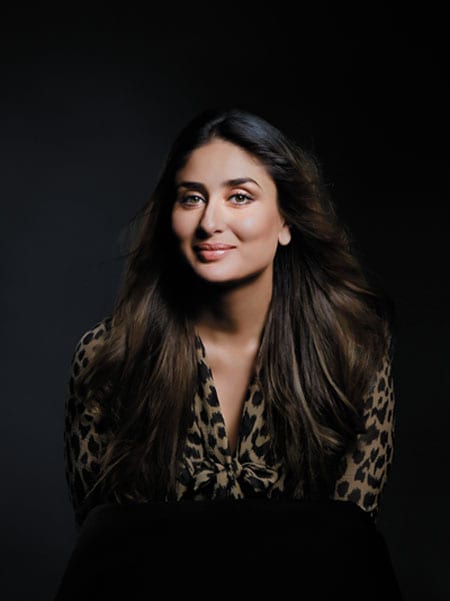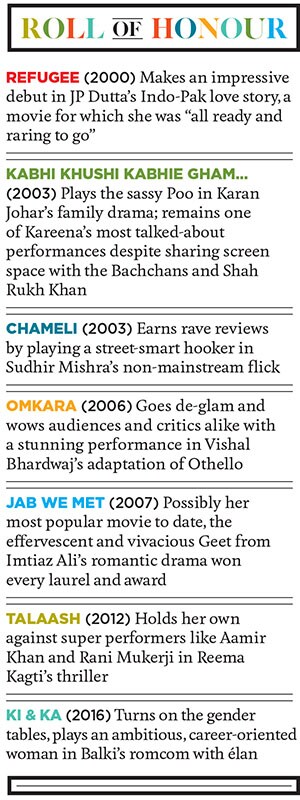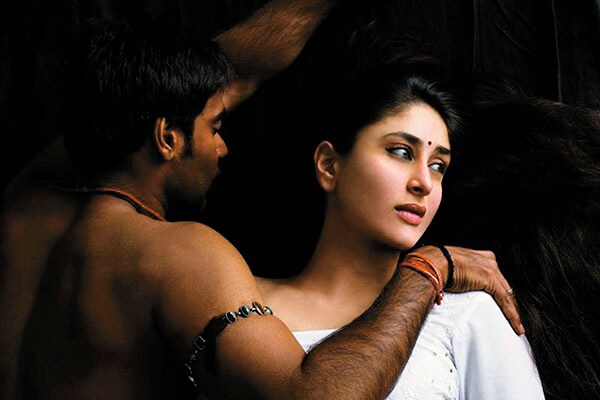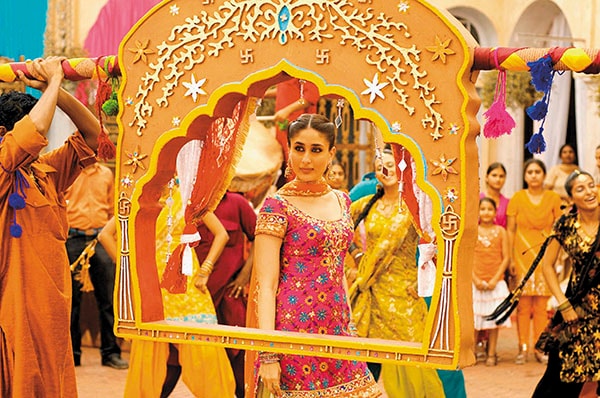Kareena Kapoor Khan: Ms Congeniality. Really.
Sixteen years of surviving Bollywood hasn't turned Kareena Kapoor Khan into a hardened cynic. Quite to the contrary. The 35-year-old actor busts a few myths about herself and explains her inner calm


 Image: Vikas Khot
Image: Vikas Khot
Kareena Kapoor Khan
Location courtesy: JW Marriott Mumbai Sahar. Stylist: Tanya Ghavri assistant stylist: Karishma Shaikh. Make-up and hair: Subhash Vagal. Dress: Burberry
Way back in 2000, veteran filmmaker JP Dutta was directing two debutants in his Indo-Pak romance-drama Refugee. Both the leads—Abhishek Bachchan and Kareena Kapoor—came from film royalty, but their acting chops were yet untested. One of the scenes required Dutta’s heroine, still shy of 20 then, to share screen space with Suniel Shetty. While Dutta was readying Kareena for the role with a round of rehearsals, Shetty, already an established name in the industry, was taking it easy, confident of getting into the skin of his character right on the floor. Finally, Dutta convinced Shetty to have one rehearsal with Kareena, and, instantly, he was shaken out of his smugness. “‘Good heavens sir, she is fantastic’, Shetty told me, and set about preparing for the role with purpose,” recalls Dutta.
Sixteen years after Refugee released and tinsel town took note of the then youngest Kapoor on the block, Kareena (Kapoor Khan, after her marriage to actor Saif Ali Khan) still evokes a similar response. In the recently released Udta Punjab, she plays a role that’s crafted almost as an aside, but Kareena brings Dr Preet Sahani alive on screen with a rock-solid performance and manages to shine in a stellar cast of Shahid Kapoor, Alia Bhatt and Diljit Dosanjh. Cinemagoers enjoy her style, directors her effortless spontaneity. And her versatile portfolio of movies—from over-the-top performances, as in Kabhi Khushi Kabhie Gham... or K3G, 2001) or Jab We Met (2007), to muted, subdued roles like in Talaash (2012) or non-mainstream movies like Chameli (2003)—has proved that Kareena is no pushover. To borrow from nouveau lingo, Kareena Kapoor Khan has been trending for 16 long years. Hashtags can often be flash in the pan. Not Kareena.
The slender corridor between the elevator and the wooden door of Kareena and Saif Ali Khan’s 10th floor penthouse in Bandra, however, doesn’t scream of this daunting CV. Instead, a Moroccan lamp and a couple of paintings make for an unusual, sobered down setting.
Barely do I finish the “I’m here to meet Kareena Kapoor” ritual in front of the domestic help who answers the door that the lady of the house appears from one side, holding open another door that leads to the drawing room. “Please don’t leave your shoes outside, just come in,” says Kareena, as she shows me to the couch. “Sorry I’m in my casuals,” she adds, explaining her peach top and patterned track pants. “Don’t feel like dressing up on an off day at home,” says the actor as she settles down amidst an array of framed photos—of both her family and Saif’s—and DVDs. “We’ve watched all of Homeland, but Skyfall is Saif’s he’s a big Bond fan,” says Kareena as she puts her hair up in a loose bun and allows it to fall down again in the middle of the sentence. Her playfulness with her hair is far removed from the immaculately groomed image that she has cultivated over the years—it is a perception that dictates that every ‘Kareena look’ visible to an outsider should be well-orchestrated. But the 35-year-old rolls her eyes when asked about it. “Style icon? Me? Hardly. Not in my own home at least. In fact, it’s a big pain to dress up and turn up at events. I never overdress. I prefer minimal make-up. I don’t know how my image of a mini-diva came along. All I can say is that I probably made casual dressing stylish. That’s it.”
Her casual demeanour on this balmy evening perhaps has a lot to do with the fact that Udta Punjab was cleared by the Bombay High Court a few days ago. Prior to that, the Central Board of Film Certification (CBFC) had sought a stay on the film, suggesting 89 cuts, including removing references to Punjab. The makers of the film had dug in their heels and the imbroglio had threatened to derail its release on June 17. “I’m happy that it’s releasing on time. Many people don’t want to talk about it, but it’s the way it is in Punjab and you’ll get to see it on the big screen,” she says. The controversy also generated hype for the film, but Kareena isn’t worried about whether the movie lives up to it. “Ultimately, it’s just a film and people should watch it as such,” she shrugs.
This equanimity in her approach is one that she has acquired from her husband, says Kareena. “Saif tells me to cut off from work to foster greater creativity, and he’s right about it. His experiences have taught him a lot and his company, in turn, has helped me relax as a person and get to know a lot more about life than just work,” she says. Acting is her biggest love—“I’d call it passion”—but not an obsession.
That explains why Kareena’s typical week isn’t complete without an off day, a time where she catches any Bollywood movie possible or sits in the balcony and sips tea. “It’s easy in this industry to get wrapped up in work. But, for me, I can relax very easily. I don’t feel restless if I am not working for a certain time. The last film I shot—Ki & Ka—was in February and I promoted it in March. After that, I haven’t done much movie work and I am very happy with the time I’ve spent by myself,” she says. “Saif and I consciously do not keep a chock-a-block schedule. It helps us unwind as well as it enhances companionship.”It’s perhaps this sense of work-life balance that’s kept Kareena off Hollywood, when her colleagues Priyanka Chopra and Deepika Padukone are making a splash in the West. She thinks what Bollywood stars are doing in Hollywood is great, but it’s not for her. “Whenever I am shooting, I need to come back home every 7-10 days.”
Saif Ali Khan’s influence on his wife, however, goes much beyond her relaxed work schedule. The conscious clutter in the drawing room, of paintings and floor-to-ceiling bookshelves, will give you an indication of what Mr and Mrs Kapoor Khan are up to on their off days. But the actor is quick to intervene with unself-conscious candour. “These are mostly Saif’s. I am an amateur reader. Out of 200 books here, two are mine and the rest are Saif’s. He is a voracious reader and is completely into non-fiction. I have begun my reading journey with Scandinavian crime writers like Jo Nesbø and Camilla Läckberg,” she says. “And I have a lot to catch up.”
In her DNA
Weeks after ForbesLife India met Kareena, her husband announced that they were expecting their first child in December. Almost on cue, speculation was rife about whether her pending projects would be shelved, or whether she would at all continue to work after motherhood.
One may find the answer in her gumption about working “till the end of her life”. Career, motherhood and family: Kareena believes women can have it all if they want. “When I was getting married, many had predicted my career was over. I think I am the only Bollywood A-lister to get a career and a marriage going on full-fledged to have worked in as many movies, if not more, after marriage as I have done before. Saif and I are on the same page on this. He tells me never to give up my career,” she says. “Saif is a modern man. He tells me that if he’s going out to work, it’s a little selfish to expect that I should sit at home.”
Actor Arjun Kapoor believes Kareena’s spirited defence of work is not merely a facade. “It’s not for effect. She means every word of it,” says the actor who starred with Kareena in R Balki’s Ki & Ka (2016). “The excitement that she has on the sets today is like a child. Her thirst for work now is just like what she had 16 years ago.”
In her penchant for work, Kareena has broken away from the tradition of the Kapoor clan in which the women, specifically Raj Kapoor’s daughters-in-law, mostly actors, have had to give up a career on the silver screen after marriage. Among them was Kareena’s mother, yesteryear actor Babita, who married the doyen’s elder son Randhir. But Kareena insists that it’s Babita who propelled her to work even after marriage. “When I was getting married, my mother specifically asked me not to give up my career,” she says. “I got married on October 16, and on the 23rd, I was to shoot the ‘Fevicol’ song for Dabangg 2 (2012). I asked Saif if he was ok with it since it was an item song. He was absolutely gung-ho. I’m sure not too many people would have gone ahead with it within a week of their marriage.”
In fact, Kareena knew from a very young age, as early as four or five, that she was going to be an actor. In a 2002 episode of her show Rendezvous with Simi Garewal, actor and talk show host Simi Garewal recounts that once, when she called up the Kapoor household in the ’80s, Kareena answered the phone and introduced herself as someone who “is going to be an actor”. Reminded of the incident, Kareena has a hearty laugh. “I was too much of a child back then I suppose. But, yes, I always knew I was going to act. Don’t ask me how, I have no answers.”
Director’s actor
While Kareena has moved away from her family custom, being one of the rare Kapoor women, besides her elder sister Karisma, to work in films, her family DNA shines through in the way she instinctively gets into the skin of a character. She isn’t a method actor — in fact, the only thing that’s part of her method is to reach the sets prepared with her lines. (“As long as I know my lines, I can improvise.”) A quality actor should be dexterous, she believes. “Sometimes when I do commercial movies, people criticise me saying you do too much mainstream and not women-centric films. I am not a politician. Women’s empowerment is great, but there is nothing wrong in working with the Khans and doing Bollywood potboilers. All I want is a versatile portfolio,” says Kareena, who loves working with Vishal Bhardwaj and Imtiaz Ali.
Imtiaz Ali, who directed Kareena in Jab We Met, cast her because he was looking for someone “who could talk incessantly without being irritating”. And, he adds, “She performs exactly according to the brief set for her, even if it’s the exact opposite of what she is as a person. She is a complete director’s actor and a thorough professional.” Her ability to uncomplicate roles also manifests in real life, in the easygoing affability that she has developed on the sets. “I’m not Poo [of K3G]. That’s Karan [Johar],” says Kareena with an impish smile.
Ali was a relative newcomer when he directed Jab We Met [his first film Socha Na Tha (2005), though critically acclaimed, had tanked at the box office] and Kareena, by then, was already a star, with a reputation of being an abrasive diva. But discussing the story with her, sitting on the floor, took Ali back to his younger days when he would direct plays and sit with the actors to discuss the nitty-gritty. Even through the course of the shooting, says Ali, Kareena was one of the easiest people to get along with. “After a few days, I insisted that she throw a tantrum so that I get to see the ‘real’ Kareena Kapoor. But she would laugh it off. Once in a while she would put on a show, but it was no good,” laughs Ali, adding that for a long time after the movie released, Kareena would text him and sign off as Geet, the character that she played in the movie.
There was evidence of this sense of congeniality through the ForbesLife India shoot that took place during the weekend after Udta Punjab was released. In one instance, the actor volunteered to do a change of outfit when she felt something was amiss. “Please tell me if something isn’t working,” she requested our photo editor, before slipping on to a black and white checked dress with a black belt.

Contrary to image
So where did this reputation of being mercurial come from? “I have no idea and I don’t bother to clarify,” shrugs Kareena. “But contrary to popular perception, I have had a rather down-to-earth, upper-middle class upbringing. My mother was a strict disciplinarian and, till today, she can’t figure for her life why I need to upgrade my car. I was sent away to Welhams [Girls’ School in Dehradun] for my senior years so that I get away from the limelight in Mumbai. And it’s because of this culture that I can meet you in my top and trackpants and not be insecure about it. I don’t have to go out and prove that I am a star.”
Did she ever insist that she would only act with A-listers, as has been claimed often? “Look at me. I have worked with every possible actor. I don’t think I am anybody to insist on working with a particular actor. If I am eyeing a prime role, would I do movies like Udta Punjab? My next [Veeray Di Shaadi, Rhea Kapoor’s chick flick for which Kareena is expected to start shooting in August] is a story of four girls and I am just one of them. I am happy to share the limelight with others if I like the script.”
Arjun Kapoor feels the star aura is a construct not of the actress but of what she has achieved over the last 16 years. “It’s not like, ‘Oh-don’t-talk-to-Kareena-she’s-a-big-star’. It’s the larger-than-life persona that she has on screen. She might be the most normal person around, but a fan will look at her with aura,” says Kapoor.
Critics point out that she’s a bit aloof to the media and perhaps to her fans as she hasn’t opened up channels of communication. Kareena doesn’t operate a public Facebook, Twitter or Instagram page. But this is a conscious choice and she is unapologetic about it. “I communicate with my fans through interviews, magazines, websites. These days a conversation between a journalist and an artist is dying because everybody’s putting everything out on social media and journalists are compiling them to put out a story. Where has the art of real conversation gone?”
Not too far, if the last 45 minutes is anything to go by. Kareena Kapoor Khan can keep it alive and kicking.
(Additional reporting by Kunal Purandare)
First Published: Aug 20, 2016, 06:23
Subscribe Now(This story appears in the Dec 17, 2010 issue of Forbes India. To visit our Archives, Click here.)

